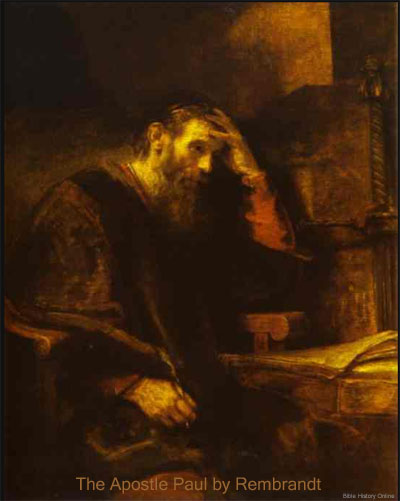2 Thessalonians Images and
NotesThe Book of 2 Thessalonians
2 Thessalonians 1:7-10 - When the Lord Jesus shall be
revealed from heaven with his mighty angels, In flaming fire
taking vengeance on them that know not God, and that obey not
the gospel of our Lord Jesus Christ: Who shall be punished with
everlasting destruction from the presence of the Lord, and from
the glory of his power; When he shall come to be glorified in
his saints, and to be admired in all them that believe.
2 Thessalonians 2:1-4 - Now we beseech you, brethren, by the
coming of our Lord Jesus Christ, and [by] our gathering together
unto him, That ye be not soon shaken in mind, or be troubled,
neither by spirit, nor by word, nor by letter as from us, as
that the day of Christ is at hand. Let no man deceive you by any
means: for [that day shall not come], except there come a
falling away first, and that man of sin be revealed, the son of
perdition; Who opposeth and exalteth himself above all that is
called God, or that is worshipped; so that he as God sitteth in
the temple of God, shewing himself that he is God.
2 Thessalonians in The New Testament - A Brief Overview

Painting of Paul the Apostle by Rembrandt - 1657
Introduction to The
Book of 2 Thessalonians
Brief Summary. It was not long after Paul had written
his first letter to the church in Thessalonica that he realized
he needed to write another letter to clarify exactly when they
should expect the second coming of Christ. They had believed
that the day of the Lord had arrived, but Paul assured them that
it had not and that there would be an Apostasy first and then
Jesus will return shortly thereafter. He also instructs them
regarding sound doctrine.
Summary of The Book of 2 Thessalonians
Content. Shortly after Paul had written his first letter
to the Thessalonians he discovers that the church in
Thessalonica had become confused regarding the Day of the Lord,
believing that it had already arrived. Paul was not aware of how
this new idea developed, especially in the light of all the
teaching he just given them. In 2 Thessalonians Paul reviews
once again what he taught them regarding the second coming of
Christ and the signs that would precede this event. He also
exhorts them that they should follow his instructions, and
separate themselves from anyone who would instruct them
differently regarding the gospel of Jesus Christ and sound
doctrine.
Thessalonica. The city of Thessalonica was the greatest
harbor of Macedonia, and it was sitting on top of large hill
overlooking the Thermaic Gulf as well as a beautiful fertile
plain. The name Thessalonica was taken from Alexander the
Great's stepsister
Thessaloniki.
Thessalonica was a very important city of the Roman Empire
mainly because of its great harbor, and the great Via Egnatia
highway which ran through it.
The Church in Thessalonica. Paul the apostle established
the church in Thessalonica along with Silas and Timothy during
his second missionary journey, around 50 AD (Acts 17:1-9). both
Silas and Timothy are mentioned at the beginning of both of
Paul's letters to the Thessalonians. Paul spent much time with
the Thessalonians because he mentioned his mutual love for them.
The church in Thessalonica consisted mainly of Gentile believers
who "turned from idols to serve the living and true God" (1
Thessalonians 1:9).
Authorship. Paul the apostle wrote both letters to the
Thessalonians.
Date. Paul's letters to the Thessalonians were written
from Corinth around 50 AD, just after he was with the church in
Thessalonica. 2 Thessalonians appears to have been written only
a few weeks, or perhaps months, after the first letter. 1 and 2
Thessalonians are considered by many scholars to be the earliest
of Paul's epistles.
Outline of the Book of 2 Thessalonians
The Coming Day of Jesus and Persecution - Chapters 1
The Coming Day of Jesus and Events - Chapter 2
The Coming Day of Jesus and Christian Living - Chapter 3

The Name Jesus In Ancient Hebrew Text
"Yeshua" in First Century Hebrew Text. This is how the name "Jesus"
would have been written in ancient Hebrew documents. The four letters or
consonants from right to left are Yod, Shin, Vav, Ayin (Y, SH, OO, A).
Jesus is the Greek name for the Hebrew name Joshua or Y'shua which means
"The LORD or Yahweh is Salvation".
II Thessalonians Maps and Resources
Map of the Roman Empire (14 A.D.) - This map reveals the
Roman Empire during the time shortly after the birth of Jesus,
in 14 AD at the time of the death of Augustus. The order which
prevailed in this extensive empire, the good military roads, and
the use of Koine Greek as the general language of culture
throughout the area were among the factors which multiplied the
rapid spread of the Gospel of Jesus Christ. (Color Map)
Map of Paul's First Missionary Journey (48 A.D.) - This map
reveals the areas in Asia Minor where Paul visited in his first
missionary journey. Around 48 AD, in the springtime, Paul and
his companions Barnabas and Mark were sent on a mission from the
church in Antioch. This would be the first of Paul's Missionary
Journey's. (Color Map)
Map of Paul's Second Missionary Journey (51 A.D.) - This map
reveals the areas in Asia and Greece where Paul visited in his
second missionary journey. Paul re-visits a couple cities in
Asia, one of which was Lystra where he was stoned and left for
dead a few years earlier. He later has a vision that leads him
over to Greece and Paul and his companions travel and minister
in various cities in Greece (Philippi, Thessalonica, Berea,
Athens and Corinth. Later Paul returns to Ephesus and finally to
Caesarea and Antioch. (Color Map)
Map of Paul's Third Missionary Journey (54 A.D.) - This map
reveals the areas in Asia and Greece where Paul visited in his
third missionary journey. On Paul's third missionary journey he
returned to the cities he had first visited on his first
missionary journey. During this time he decided to remain in
Ephesus for about 3 years, and this city was the main focus of
his activities and an important Christian community (Acts 19).
(Color Map)
Map of the New Testament World - This map reveals the
"Nations" within the ancient world during the first century
A.D., the time of the New Testament. The map includes the areas
of Israel, Asia, Greece, and Italy. (Color Map)
Map of New Testament Greece This map reveals the cities
within Greece in the ancient world during the first century
A.D.,The map includes the principal cities of Greece like:
Athens, Corinth, and Thessalonica, and provinces like Macedonia
and Achaia. (Color Map)







